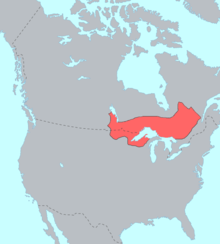Our website is made possible by displaying online advertisements to our visitors.
Please consider supporting us by disabling your ad blocker.
Ojibwe
 Precontact distribution of Ojibwe-speaking people | |
| Total population | |
|---|---|
| 170,742 in United States (2010)[1] 160,000 in Canada (2014)[2] | |
| Regions with significant populations | |
| Canada (Quebec, Ontario, Manitoba, Saskatchewan, Alberta) United States (Michigan, Wisconsin, Minnesota, North Dakota, Montana) | |
| Languages | |
| English, Ojibwe, French | |
| Religion | |
| Ojibwe religion, Catholicism, Methodism | |
| Related ethnic groups | |
| Assiniboine, other Algonquian peoples Especially other Anishinaabe, Cree, and Métis |
| Person | Ojibwe ᐅᒋᐺ Anishinaabe ᐊᓂᔑᓈᐯ |
|---|---|
| People | Ojibweg ᐅᒋᐺᒃ / ᐅᒋᐺᐠ Anishinaabek ᐊᓂᔑᓈᐯᒃ / ᐊᓂᔑᓈᐯᐠ |
| Language | Ojibwemowin ᐅᒋᐺᒧᐎᓐ Anishinaabemowin ᐊᓂᐦᔑᓈᐯᒧᐎᓐ |
| Country | Ojibwewaki[3] Anishinaabewaki ᐊᓂᔑᓈᐯᐘᑭ |

The Ojibwe (/oʊˈdʒɪbweɪ/ ⓘ; syll.: ᐅᒋᐺ; plural: Ojibweg ᐅᒋᐺᒃ) are an Anishinaabe people whose homeland (Ojibwewaki ᐅᒋᐺᐘᑭ)[3] covers much of the Great Lakes region and the northern plains, extending into the subarctic and throughout the northeastern woodlands. The Ojibwe, being Indigenous peoples of the Northeastern Woodlands and of the subarctic, are known by several names, including Ojibway or Chippewa. As a large ethnic group, several distinct nations also consider themselves Ojibwe, including the Saulteaux, Nipissings, and Oji-Cree.
According to the U.S. census, Ojibwe people are one of the largest tribal populations among Native American peoples in the U.S. In Canada, they are the second-largest First Nations population, surpassed only by the Cree. They are one of the most numerous Indigenous peoples north of the Rio Grande.[4][better source needed] The Ojibwe population is approximately 320,000, with 170,742 living in the U.S. as of 2010[update][1] and approximately 160,000 in Canada.[2] In the U.S. there are 77,940 mainline Ojibwe, 76,760 Saulteaux, and 8,770 Mississauga, organized in 125 bands. In Canada they live from western Quebec to eastern British Columbia.
The Ojibwe language is Anishinaabemowin, a branch of the Algonquian language family.
The Ojibwe are part of the Council of Three Fires (along with the Odawa and Potawatomi) and of the larger Anishinaabeg, which includes Algonquin, Nipissing, and Oji-Cree people. Historically, through the Saulteaux branch, they were part of the Iron Confederacy, with the Cree, Assiniboine, and Metis.[5]
The Ojibwe are known for their birchbark canoes, birchbark scrolls, mining and trade in copper, and their harvesting of wild rice and maple syrup.[6] Their Midewiwin Society is well respected as the keeper of detailed and complex scrolls of events, oral history, songs, maps, memories, stories, geometry, and mathematics.[7][failed verification]
European powers, Canada, and the U.S. have colonized Ojibwe lands. The Ojibwe signed treaties with settler leaders to surrender land for settlement in exchange for compensation, land reserves and guarantees of traditional rights. Many European settlers moved into the Ojibwe ancestral lands.[2]
- ^ a b "CDC – American – Indian – Alaska – Native – Populations – Racial – Ethnic – Minorities – Minority Health". 2 December 2012. Archived from the original on 2 December 2012.
- ^ a b c "Ojibwe | The Canadian Encyclopedia". www.thecanadianencyclopedia.ca. Retrieved 2021-01-31.
- ^ a b Jelsing, Kaden Mark (2023). Sovereign Futures: Indigenous and Settler Prophecies in Two Nineteenth-Century American "Northwests" (Doctor of Philosophy thesis). University of British Columbia. p. 57. ᐅᒋᐻᐘᑭ
- ^ Spencer, Kelly (August 31, 2020). "The rock carvings of Kinoomaagewaabkong". Norfolk & Tillsonburg News. Retrieved January 31, 2021.
- ^ "BEACH HOUSE – MYTH". YouTube. Archived from the original on 2018-06-30.
- ^ Redix, Erik M. (October 8, 2018). "Maple sugaring's roots with the Ojibwe people run deep". MinnPost. Retrieved June 10, 2023.
- ^ "Anishinabe". eMuseum @ Minnesota State University. Minnesota State University. Mankato. Archived from the original on 2010-04-09. Retrieved 2010-03-16.
Previous Page Next Page


